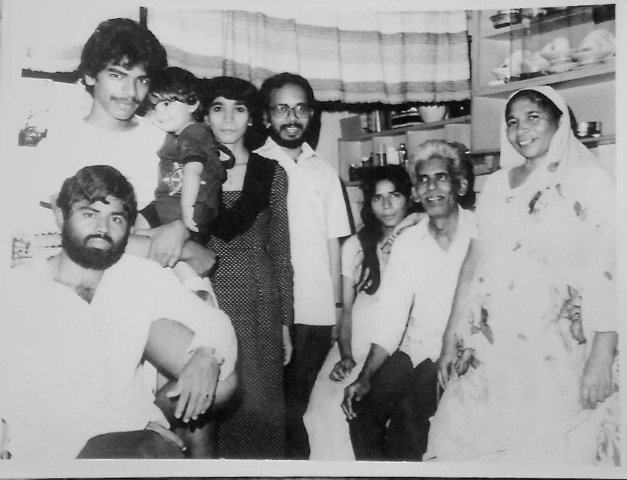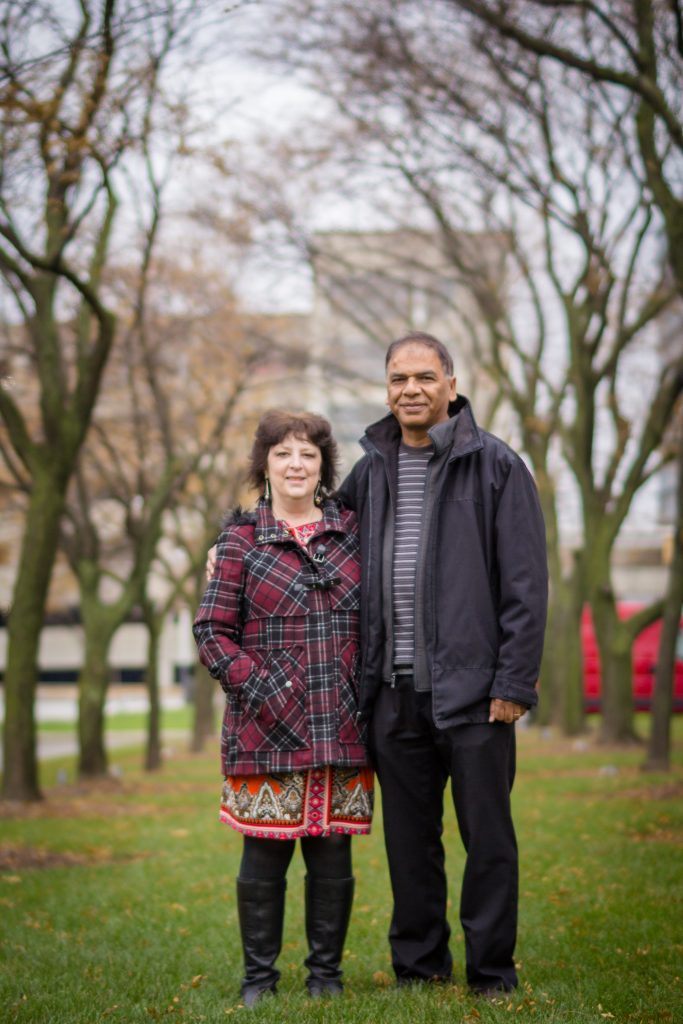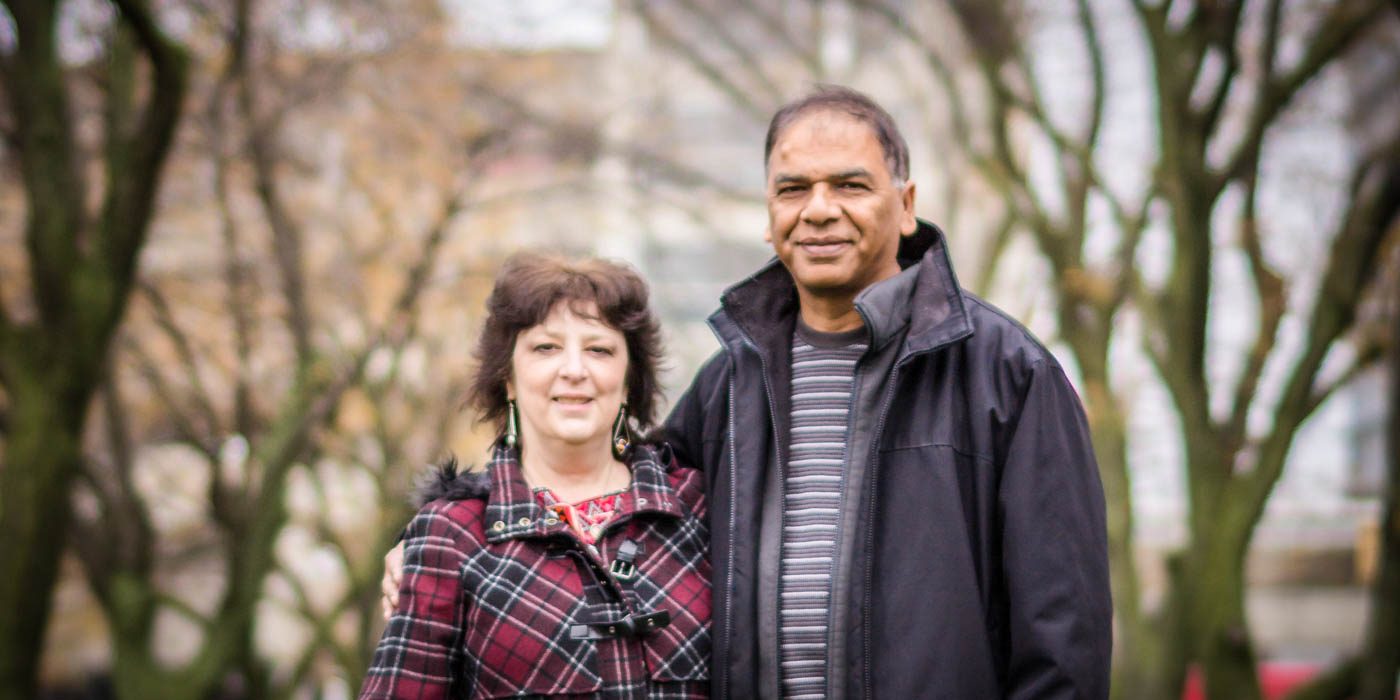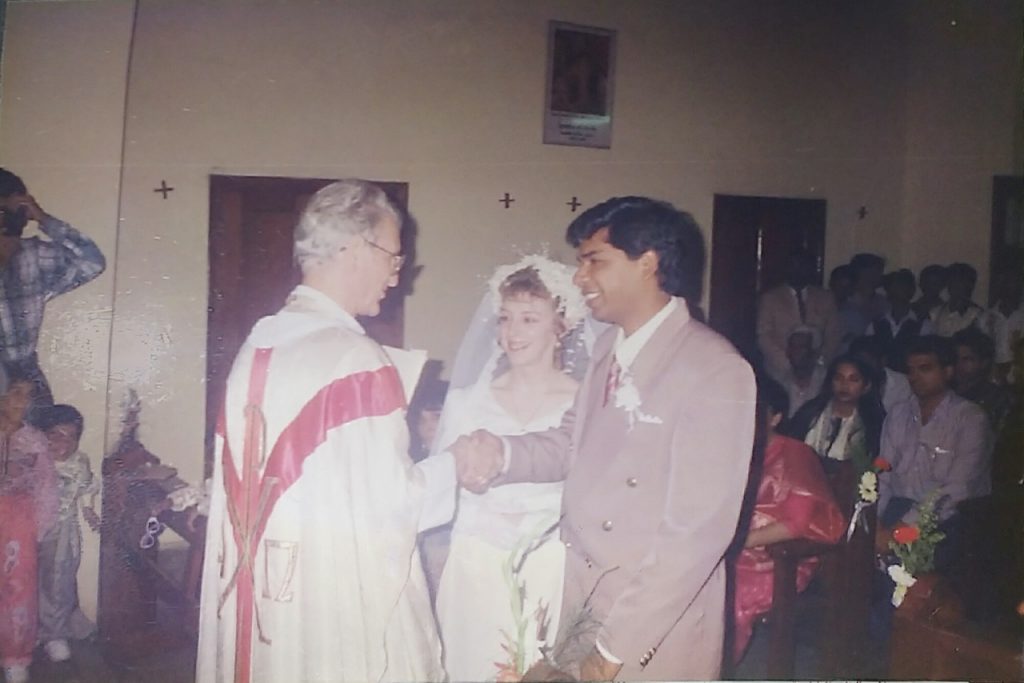November 21, 2017 // Local
‘We are all God’s children:’ Couple advocates interfaith dialogue, compassion
Steven Shaikh was born and raised in India. As a Muslim, he witnessed violence in the name of religion and consequently became an atheist. While he knew there must be a higher power, his anger caused him to deny God’s existence.
 In 1986, 24-year old Shaikh was hiking through the mountains, unaware that his faith journey was about to leap forward. As he walked through a long tunnel, a thundering sound suddenly came from the other side. Leaving the tunnel, he came upon a cloud-filled valley and realized a turbulent waterfall had just begun from high above. It was monsoon season, and heavy rains had caused the waterfall to form in a spot that had been peaceful just moments before. The water was showing its strength and causing the thunderous sound.
In 1986, 24-year old Shaikh was hiking through the mountains, unaware that his faith journey was about to leap forward. As he walked through a long tunnel, a thundering sound suddenly came from the other side. Leaving the tunnel, he came upon a cloud-filled valley and realized a turbulent waterfall had just begun from high above. It was monsoon season, and heavy rains had caused the waterfall to form in a spot that had been peaceful just moments before. The water was showing its strength and causing the thunderous sound.
Reflecting back on that moment, Shaikh said his thoughts were, “Any of this will kill me in an instant.” “My ego was destroyed, in a sense. That’s when I felt the presence of God.” He had reached a turning point, and this new direction would lead him to the Catholic Church, a new life in the United States with a loving wife and daughter, and challenges that he had unknowingly been preparing for his whole life.
Shaikh’s father was raised Catholic, but converted to Islam to marry Shaikh’s mother, a Muslim. They settled in the Indian city of Pune and opened their own business, a grocery store. Shaikh and his siblings were sent to Christian schools. Ultimately though, he said it was his Muslim mother who provided the best example of Christian discipleship.
When he was 9 years old, there was an outbreak of violence between Hindus and Muslims. One day, he said, their family was warned by friendly Hindu neighbors that their grocery would be attacked. Around midnight, “people came with axes, swords and sticks and destroyed the store.” The next day, police officers arrived and asked Shaikh’s mother if she knew who did it. Even though the culprits were milling around the store at the time, she did not identify them. Instead, she said, “the people who broke into our store are right around here, but they are my brothers. I forgive them. I’ll re-build the store. They can come and break it again. I’ll keep on re-building.” Shaikh said he took note of his mother’s compassionate response, but still attributed this incident of violence in the name of religion as a major reason why he became atheist.
During this period, Shaikh said he felt called to search for answers. “Even though I didn’t believe in God, I traveled to a lot of different places to see where I could find peace.” Ultimately, it was his hike in the mountains at the age of 24 that gave him the peace he had been searching for. When he returned, he met with a visiting priest and family friend. Shaikh said the priest emphasized that, “‘Catholicism is all about love. Focus on that, and everything will fall into place.’” Shaikh soon became Catholic.
Susan Shaikh was born and raised in Fort Wayne. Steven’s sister, who was also living in Indiana, thought Susan would be a good match for her brother. She connected the two, and the couple began writing letters and talking on the phone, and they eventually met in India. They were married 13 days later, in January 1997: The priest who baptized Steven presided over their Catholic wedding. The next day there was a Muslim celebration, too. They eventually settled in Fort Wayne where Steven, now an Indian immigrant, would face some unexpected, but all too familiar, challenges.
During the first year Steven said he noticed the occasional disapproving glance, but after 9/11 it became more open and more frequent — with yet another uptick after last year’s election. Susan recounted a day when Steven was mowing their lawn, and a van started slowly driving back and forth in front of their home. After four or five passes, Susan advised Steven to come inside the house.

Steven and Susan Shaikh of Fort Wayne are parishioners at St. Jude. They have witnessed and experienced, throughout Steven’s lifetime, the effects of religious discrimination and violence. The couple continues to respond with understanding and compassion. — Nate Proulx
Steven remembered when he was called an “Islamic terrorist” by a stranger as he walked down a Fort Wayne street. A similar incident happened at a mall, with their daughter present. Another time, it was at a local restaurant. And yet again, about a month ago, the day a terrorist drove a truck down a busy bicycle path in Manhattan and killed eight people in the name of ISIS, Steven was stared down by a stranger driving an adjacent car.
Steven was once again experiencing unfair treatment, this time because of his skin color and Muslim last name. However, just as Steven’s mother forgave the vandals who destroyed their family store, Steven and Susan reacted with compassion — even though there were times when their initial reaction was, understandably, anger.
Noting his recent encounter with the stranger who stared him down after the Manhattan attack, Steven said he “got angry and stared back. That is where I failed. That’s when Jesus should have hit me on the head and said ‘Steven, you’re not my follower if you do that.’ In retrospect, there’s remorse.” Susan added, “We try to remember for that one person who hates him because of his skin color or who he is, or his last name, there are 99 other people who love and adore him. We need to focus on those 99.”
Steven and Susan hope to share their experiences as a way to build bridges and ease racial and religious tensions. When they heard the Diocese of Fort Wayne-South Bend had partnered with the newly formed ecumenical group Northeast Indiana Congregation Action Network, or NE-ICAN, they were thrilled. They had been hoping for an organized interfaith dialogue to begin, and that is one of the aims of NE-ICAN. Steven is grateful the diocese is playing a part in the group, and said, “Do you see why I love being Catholic? That’s the reason.”
As NE-ICAN continues to grow and evolve, the Shaikhs are brainstorming ways they can best assist, including ways to educate people of all ages so others don’t have to experience what they do. Susan said, “No matter if you’re Muslim, Christian or Hindu, people just want to live the best lives they can.” To which Steven added, “We are all God’s children.”
The best news. Delivered to your inbox.
Subscribe to our mailing list today.







